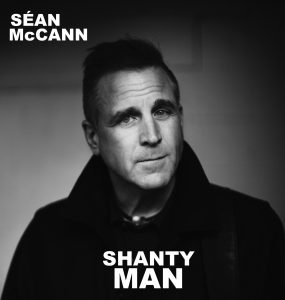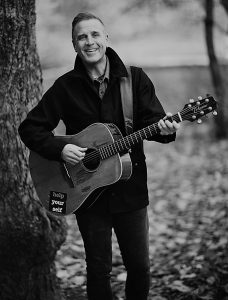
Musician and Great Big Sea alum Sean McCann knows a thing or two about good music. To whit, he was good enough to chat with Celtic Life International about his latest album, Shantyman. McCann knows a thing or two about mental health as well, and he shares his thoughts on what it will take for us all to reach the other side of this COVID-19 situation – together.
What are your own roots and where do you currently reside?
I am Sean McCann, the Shantyman from Newfoundland! I grew up on the Rock, and I currently reside in Manotick, Ontario – just outside of Ottawa. My people, the McCann clan, are from Co. Armagh in Northern Ireland. We are the 7th generation out of Ireland; my people settled in a little place called Gull Island, NL, and started fishing. We have been there ever since. I am always drawn back home, and I just literally came back from there. It was good to get by the ocean again, and to see my people, my parents. We have a saying in Newfoundland; when my grandfather met someone he didn’t know, he would ask them, ‘where do you belong?’ It was a deep question. It meant something a little deeper than your location of birth.
When and why did you get into music?
I grew up with song in my community. Everyone was always in some band or another. But I was a bit of a late bloomer; I focused on hockey when I was in high school. I was always a fan of the music, but I wasn’t of the music. I wasn’t doing it. Newfoundland had Ryan’s Fancy and Figgy Duff – just great bands. And I got to meet these people. I would see these bands in little, small clubs. Given that I had a desire to see where I belonged to, where I came from, I went to Ireland when I was 19, spent some time driving around the country, and a lot of time in Co. Clare. I was blown away by the music, honestly, and for the respect that people had for music. It just enchanted me. My first public appearance – the first time I sang a song for an audience – was in O’Donovan’s in Dublin, where the Dubliners were known to frequent. I sang a song called Bachelor’s Morning, and people got really quiet, and they paid attention. They accepted me into their community, and the next thing I know, I am back the next night with the band, learning how to play the bodhrán. I came back from that a changed man with a sense of purpose. I wanted to do this.

Tell us about your work in music today, and your new album, Shantyman.
Well, we are all under duress, we are all challenged – musicians in particular, both financially and emotionally. I mean, music is what we do for a living, and that has been taken away. But it is also what we do for life. I am 54, and I have lived through a lot. I have overcome a lot of challenges – I have been sober for 10 years, and in recovery. I have gotten through a lot of things and toughened up quite a bit. I am confident that I will get through this; I will work through it. And what I do is work. I never stop working. Life, to me, and work are the same thing. I am lucky that way. So, we didn’t pause – we put out a book, One Good Reason. Pandemic or not, we still do what we do. I am a singer, and I am a folklorist. So, we can’t do it live? We can’t do it in a studio? We learned how to do it by ourselves. It was a learning curve for me, but I recorded this entire record myself first, in my studio, with the intention of releasing it as my personal pandemic project. But it was just good enough to catch my ear. I have made a lot of records – this is my 16th. I took a week away from it, came back, and I heard a record. I wanted to bring it to its potential, and I knew I couldn’t do that myself. But we have the technology to tap my friends; Hawksley Workman, J.P. Cormier, and ‘Big Sugar’ Gordie Johnson. It was a lot of time and effort from everyone involved, but we just didn’t give up. It never even occurred to me once not to do it.
Do you have any favourite tracks?
I like Rolling Sea quite a bit. I am a child of the ’80s and a reggae fan. I do a lot of kayaking, and that song just reminded me of being on the ocean in Newfoundland, riding 10-foot swells. I believe folk music is not static, it must be dynamic and evolve. Hopefully, this was an evolution.
And what about your work in mental health? How are music and mental health connected?
Music rises above hard times. When musicians are under duress, that is when they write their best. That is when I write my best. When I am compelled to say something important, that’s a better song. Always is. That is why I have such faith in our ability to recover from all this.
How has the importance of the awareness and advocacy of mental health issues changed during COVID-19? This has been a challenging time for us all.
It’s super important. These are difficult times. The success of my own recovery was based on my ability to finally accept the truth, the reality of the situation. And right now, we don’t have much choice. A lot of people – myself included – spend their lives avoiding the hard choice. We are afraid. Truth is hard. Work is hard. We will do just about anything to avoid it if we can. But we are all in the same position, and there has to be work done. The last thing we can afford to do now is lose faith or pretend that it’s not happening. There is going to be fallout from this ongoing pandemic, and it is going to be mental health related. We are going to need to use the tools that are at our disposal. One of those tools is music. Music does no harm, helps us feel good, and helps spirits. I have seen it happen, and it is something we can all access. The sea shanty, historically, was a song designed specifically to help people overcome difficult challenges by working together in unison. It literally kept the time while sailors pulled heavy ropes aboard ships, hauling in nets full of fish. But they were able to do it, not solo, but together. This is why music is so important now. It is what binds us. It is what we can do together to get it done. The only way we will conquer COVID-19 is if we work together. And that is what the world needs, really. We need to be together right now.

What more can be done to treat and to support those facing mental illness, coming out of COVID-19?
I think that leaders especially, instead of trying to spin victories out of failures, need to acknowledge them when they have them. And not to dwell on them, but to be honest with people. A lot of the problem with the pandemic is the emotional back and forth. There has been a lot of saying one thing, and then going back on that. That just stresses people out. We are all in the same boat – just tell us the truth. Because it has gone on so long, there is going to be a mental health price to pay. And the front line is where we are going to feel it first. Nurses are quitting in record numbers, and that is something that we can ill-afford. And they are quitting because they are overworked, and it has gone on too long, and so we need more nurses. We need more doctors that are focused on wellbeing – mental wellness, as opposed to just arms and legs. But I am optimistic. We humans have done some pretty stupid stuff, but we have survived in spite of it. We just need to be smart and acknowledge truth and practice resilience. This challenge we are all facing – I don’t think it will be the end of us, it will make us stronger.
What is on your agenda for 2022?
I foresee myself doing a lot of work with music in the mental health field – wherever I can, wherever I am allowed to. I do a lot of virtual work, but it works best face-to-face. But I think we are getting close to that. I think there is going to be a lot of work for me to do, and I am happy to do it. Also, I have kids – two teenage boys. I want to make sure that they come out of this more resilient. As parents, we must keep an eye on that, and on each other. I always look for my sense of purpose, and I need to be in that conversation, with my guitar. So, my job is going to be what it always has been – walk there, with the truth in one hand, and my guitar in the other.




















Leave a Comment